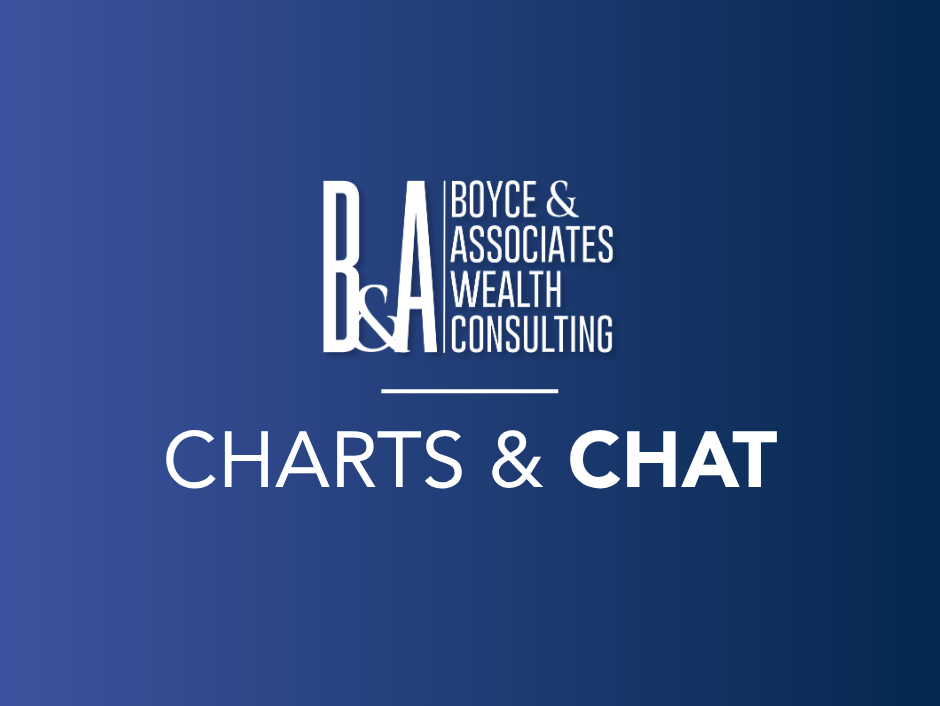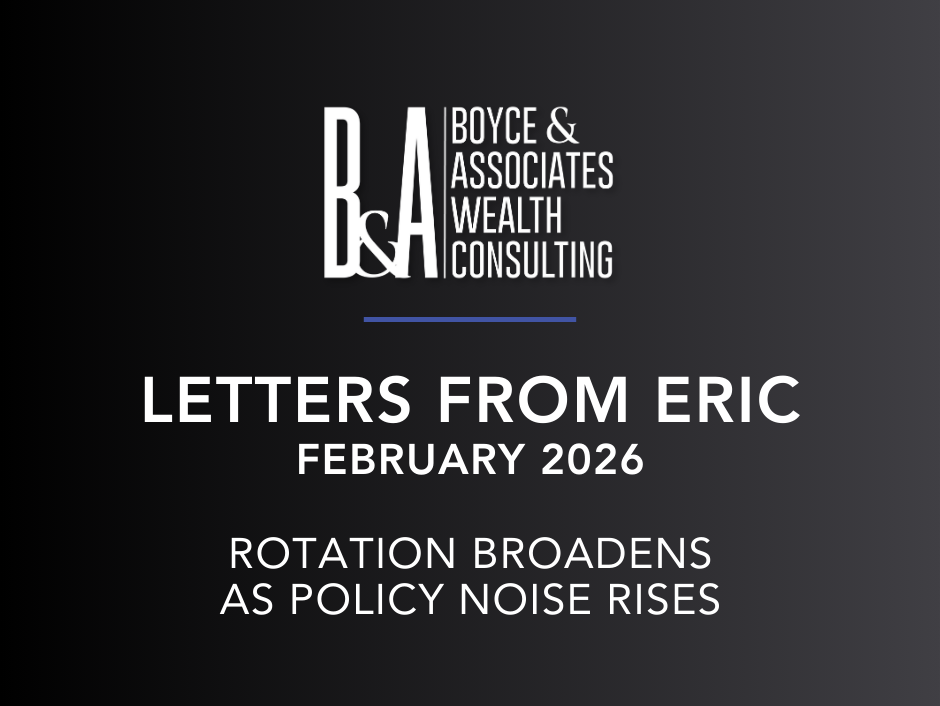Welcoming 2024
Dear Boyce & Associates Friends and Family,
As we enter the new year, your team at Boyce & Associates would like to take a moment to express our sincere gratitude for your trust and confidence. It has been a privilege to partner with you on your financial journey, and we look forward to continued progress in 2024.
During the past year, we welcomed a new brand, website, office location, newsletter, and tools to help us analyze and consult with our clients. Looking ahead, we plan to enhance our communication with timely articles and information we believe will interest clients, and we also plan to host more online and in-person educational events, including an economic update in early February. For our business owner clients, we will also introduce a quarterly newsletter and education highlighting our separate certified business appraisal practice, Boyce & Associates Business Valuations.
Two particular items of note. I am very excited to announce that Boyce & Associates is in the process of acquiring an established and respected college planning practice, and we expect to be able to share more information on that very soon. In addition, we will be rolling out soon a complimentary cash management platform to allow our clients to obtain attractive yields on idle non-investment cash balances currently held in low yielding commercial bank accounts.
As always, we take our community stewardship seriously, and our team and company will continue to find ways to give back and pay it forward. We hope to plan another event this summer with a charitable intent, so please stay tuned.
In addition, we are researching ways to both enhance portfolio success and manage risk, including but not limited to strategies surrounding concentrated positions, tax efficiency, structured notes, and alternative investments such as private credit and private equity.
From an investment and economic standpoint, 2023 presented us with unique opportunities and challenges. As of December 21, 2023, the economic picture was mixed, with some distinctly positive signs as well as a few areas we will need to monitor:
Positive Developments:
-
Growth: Surprisingly, the U.S. economy has outperformed expectations in 2023, with Q3 GDP growth reaching 5.2%, the fastest since late 2021. Overall growth for the year is expected to be around 2.5%.
-
Resilient Labor Market: The November jobs report showed continued strength, with 199,000 jobs added and unemployment down to 3.7%. Wage growth remains steady at around 4%.
-
Disinflation: Although still above the Fed's target, inflation has been cooling faster than anticipated. November CPI came in at 3.1%, and core CPI slightly increased to 0.3%.
-
Consumer Spending: The consumer was resilient in 2023, posting better-than-expected retail sales and consumption, paced by real wage growth.
-
Easing Interest Rates: The Federal Reserve signaled peak rates at its December meeting, potentially paving the way for rate cuts in 2024.
Considerations for 2024:
-
Slower Growth: While 2.5% growth is respectable, it is down from earlier estimates, and the Fed expects a further slowdown in Q4 and 2024.
-
Consumer Spending: As strong as 2023 was from a consumer standpoint, we have observed a decline in excess savings and personal savings levels and the potential impact of negative money supply growth.
-
Geopolitical Uncertainty: Global conflicts and tensions, like the war in Gaza and Ukraine, create risks for trade and energy markets.
-
Debt: High levels of government and household debt raise concerns about future vulnerabilities to economic downturns.
-
Market Volatility: Despite signs of stabilization, financial markets remain volatile, potentially impacting investment returns.
-
Oh, and there is a Presidential election…
However, amidst these uncertainties, it is important to remember our shared commitment to your long-term financial goals. We are here to help you navigate the important retirement, estate, tax, and educational planning required to help you get there. Market fluctuations are inevitable; however, staying invested for the long term remains crucial for wealth creation, recognizing that life events like career transitions, family changes, or retirement goals can also alter your financial landscape. We'll continue to keep you updated on economic trends and market developments, providing clear insights to help inform and guide important financial decisions.
We encourage you to stay in touch, no matter how big or small the question. Our doors are always open for regular check-ins, strategy discussions, and any concerns you may have. Your financial journey is our journey, too, and we are here to support you every step of the way. As we bid farewell to 2023 and welcome the possibilities of 2024, we do so with optimism and unwavering dedication to your financial success.
On behalf of the entire team at Boyce & Associates, I wish you a safe, prosperous, and joyous New Year.
Sincerely,
Eric C. Boyce, CFA
President & CEO










